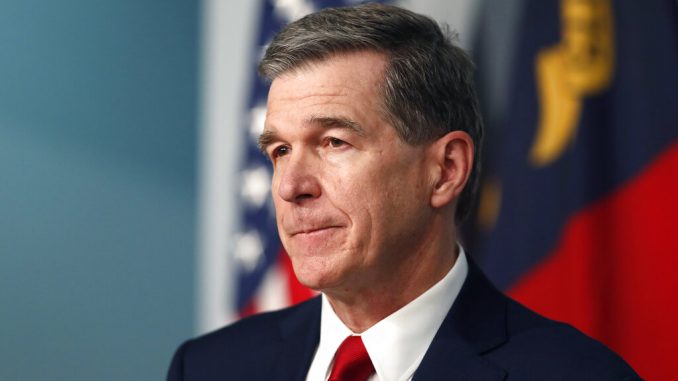
On Aug. 5, Gov. Roy Cooper extended his Phase 2 order. Most everyone is aware of that by now, but his original Phase 2 order and the latest order contain an alarming statement which many people have overlooked and the media has ignored.
In the long list of recitals Cooper uses to justify his decision to continue North Carolina’s partial shutdown, Cooper states:
“WHEREAS, should there be an increase in the percentage of emergency department visits that are due to COVID-19 like illness, an increase in the daily number of laboratory-confirmed cases, an increase in the positive tests as a percent of total tests, or an increase in COVID-19- related hospitalizations that threaten the ability of the health care system to properly respond, or should the State’s ability to conduct testing and tracing be compromised, it may be necessary to reinstate certain restrictions so as to protect the health, safety, and welfare of North Carolinians;”
His previous Phase 2 order, Executive Order 141, includes substantially similar language. Statements like these should worry North Carolinians for several reasons.
The first problem is that he’s warning the public he might “reinstate certain restrictions,” but that is less of a warning and more of a threat. Given a variety of circumstances listed in the order, he might not move forward to Phase 3 and could even move backward from Phase 2. Essentially, he is telling North Carolinians to comply with his edicts or face further restrictions. Any time an elected official threatens the public with “certain restrictions,” the public has cause for concern.
Another problem with the threat to reinstate restrictions is that his order lists so many triggers. Some triggers, including the percentage of emergency room visits “due to COVID-19 like illness,” may not reflect anything meaningful about actual COVID-19 spread.
North Carolina needs to ask important questions about those triggers. Who will determine whether an increase in hospitalizations threatens the ability of the health care system to respond? What metrics will be used to make that determination? The same questions apply to determining whether the state’s ability to conduct testing and tracing has been compromised.
We do not live, or until this year have not lived, in a state with a governor who could yield unbridled power by the stroke of a pen. The governor is obligated to take an oath to support the state constitution and to faithfully perform his duties. Article II, §5(4) of the North Carolina Constitution requires the governor “take care that the laws be faithfully executed.” Yet, Cooper has no qualms about ignoring the rights of the people. Suspending laws is expressly forbidden by Article I, §7. Has Cooper simply decided to ignore that part of the constitution? Does he think the constitution is a buffet and he can pick the parts he likes and leave the rest behind?
Should someone remind him the constitution isn’t a Golden Corral?
One also must wonder why Cooper included the threats to reinstate restrictions. If Cooper genuinely believes that he has the legal authority to unilaterally shut down the state, he would have no need to tell people that he might impose restrictions. Are his threats to reinstate restrictions a sign that he knows he doesn’t have the authority to issue such restrictions but hopes these warnings will psychologically condition the public to expect them?
These are hard questions, but now is the time to start asking them. If the media won’t or can’t ask, individuals and businesses must. The public has the right to demand answers. Good government requires transparency. Accountability depends on it. The future of our constitution and freedom hinges on it.
We must never forget, “All political power is vested in and derived from the people; all government of right originates from the people, is founded upon their will only, and is instituted solely for the good of the whole.” N.C. Const. art. I, sec. 2.
Jeanette Doran is president and general counsel for the North Caroling Institute for Constitutional Law.


